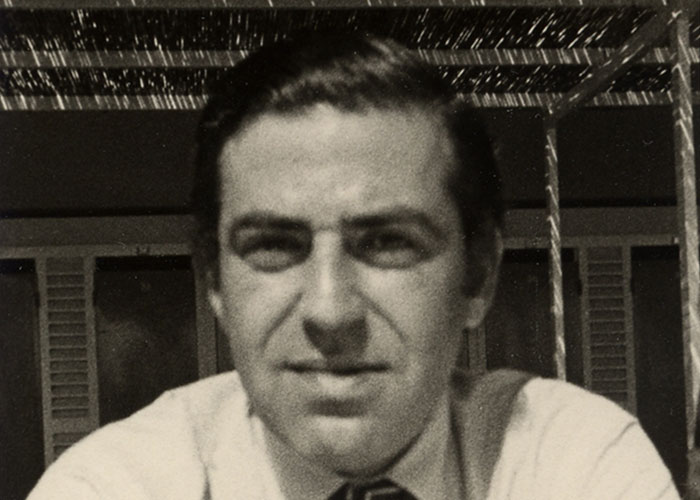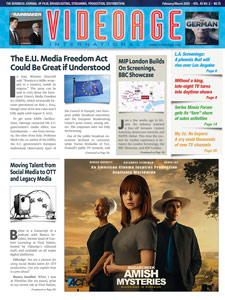Herbert “Herb” Lazarus has become the reason and example for why many TV executives no longer (voluntarily) retire. At 80 years old, with 60 years in the business, Lazarus is still going strong as president of the Los Angeles-based Carsey-Werner International.
Lazarus began in the TV business in 1954, when the international TV distribution business was fun, and both competitors and buyers were friends. When the sector lost its “fun” part, Lazarus strategically joined Carsey-Werner International TV distribution in 1996, selling…comedies. His older brother, Mell, was having fun as a cartoonist with strips such as Miss Peach and Momma.
Over the course of his career, Lazarus has worked with 13 companies, including a brief stint as a consultant, and at three incarnations of Silverbach-Lazarus, a partnership with close friend Alan Silverbach. Looking back, he said that for an independent distributor, his early challenges were the same as today: “Getting recognition and being able to get a hold of the right programs.”
As far as business is concerned, Lazarus said that over the years, it “changed for the good, for those people who had the programs.”
However, he acknowledged, “The international side of the business was more of a relationship business than the domestic side. Domestically, when launching a first-run syndication show, or an off-net syndicated show, it’s a numbers game. ‘What are the demos? What are the ratings?’ Internationally, if both a competitor and I had a western, the show was purchased from the guy the buyer liked, considering that the shows were both good.”
Lazarus remembers exactly when his fun began: it was January 10, 1954, when he was a 19-year old “gofor” at the two-year-old Television Programs of America (TPA) in his native New York City. He explained “gofor” (a verb-phrase that was later modified into the noun “gofer”) as “go for coffee, go for mail… Later, I moved into the ‘shipping department,’ sending film reels to TV stations. We used to bicycle 16-mm prints around the U.S.”
In an October 1999 Q&A with VideoAge, Lazarus explained how he entered the business: “[Mell] was designing an end credit for [TPA], a TV production and distribution company. His friend, who had commissioned him to do it, was Al Capp’s brother Jerry (Al Capp created the L’il Abner comic strip). Later, my brother called Jerry and helped me get a job [with TPA]. At that time, I had left a watch company and had just come back from California.”
When TPA was purchased by Independent Television Corporation (ITC) for $11.35 million in 1958 ($94 million in today’s dollars), Lazarus became sales coordinator. (In 1960, ITC was sold to the U.K.s Incorporated Television Company, founded by Lew Grade in 1954 and then known as ITP.)
Lazarus left ITC to join TeleSynd, which, among other things, owned Lassie. He stayed with the company until it folded two years later. In 1963, he was hired by Alan Silverbach, who was running the domestic and international TV operations at 20th Century Fox Television. He began as his assistant, and ended up becoming vice president, TV International, because, he said, “International was a fun business in those days.”
He recalled that at the time, Fox offices were in the Hell’s Kitchen neighborhood of New York City, which wasn’t a safe area. “In the summertime, at 9 p.m., Fox set up a big screen on the street and ran a movie to help ease tensions.”
Eight years later, Lazarus went to Columbia Pictures Television, also as vice president, TV International. He left New York in 1973 and moved to Los Angeles. After six years with Columbia, he reunited with Silverbach, partnering for the Silverbach-Lazarus Corp (S-L), an international distribution company, which in its first incarnation lasted until 1978.
That year, the partnership was sold to Metromedia, and Silverbach became president and Lazarus EVP of Program Distribution. In 1979, Metromedia created Amicus, a distribution company formed with Polygram and Lorimar, which lasted just 30 months, before both Silverbach and Lazarus bailed, and after getting back both the name and the catalog, revamped the Silverbach-Lazarus company. “What we put in, we got back,” said Lazarus during a telephone conversation.
That second incarnation lasted until 1985, when S-L was sold to London Weekend Television (LWT). When LWT decided to get out of the distribution business, ownership of S-L went back to the original principals for its third and final incarnation, which lasted until 1993. After one year of freelance and consultancy work, Lazarus joined Stephen Cannell as vice president, Cannell Distribution. He left Cannell when the company was sold to New World and became president of Carsey-Werner International, his current company, in 1996.
Lazarus attended his first MIP-TV in 1965 for 20th Century Fox and, as he recalled, “I can be certain that no American studios [attended the first MIP-TV in 1963]. I do remember an MPAA export committee meeting, where we were told that ‘a market’ had started in Lyon and was moving to Cannes, and would we attend? All the companies sitting around the table said no until it came to Fox, which said yes, and that’s when the other guys said ‘if Fox goes we will have to go as well.’”
After that, most of the other MIPs were memorable. “The year was 1969. At 20th Century Fox, Alan Silverbach was the head of all TV Distribution. I was heading up International Distribution and Bill Saunders was our European manager. We decided to have a dinner for 40 of our clients at a restaurant in Antibes called Felix Au Port. Bill was the host,” he recalled.
“We got a bus to pick up our clients at the various hotels and gave them champagne and tidbits to eat on the ride to Antibes. Fabulous dinner, the clients were happy.
“When it came time to go back to Cannes and Alan and I were getting the people back on the bus, two things happened. First, one of the guests told us that while he had a great evening, he wasn’t one of our clients, and was supposed to be at a FIFA dinner instead. He had gotten on the wrong bus. Second, Bill was in the kitchen of the restaurant settling the bill when he got Alan and my attention and asked us to come to the kitchen.
“The bill for the dinner was 40,000 francs, and Bill said he didn’t have enough money with him. Felix did not take credit cards or checks, so could we chip in? I asked Bill how much he had and he said 1,500 francs.
“After screaming with laughter and asking Bill how he could invite 40 people for dinner without having enough money, he said he thought a credit card would be acceptable. Fortunately, Alan and I were carrying enough francs to help Bill out.”
Alexandra Taylor, evp Carsey-Werner International in London, shared another anecdote “Herb was going to have dinner with clients from an Asian channel. It turned out that the clients were rather uneasy about having dinner because a decision had just been made not to renew one of our series.
When they all met at the restaurant and sat down, one of the clients starting by saying ‘Thank you for inviting us. However I have some bad news that will upset you…’
Before he could finish his line, Herb stopped him by saying ‘then let’s not upset me, let’s enjoy dinner.’ This diffused the entire situation and the clients started to laugh. They had a good evening. The next day the clients came by the stand and said they had so much fun, they decided to renew our show instead of that of another supplier.”
By Dom Serafini
Comprehensive stories about Herb Lazarus were published in the April/May 1988 and October 1999 Issues of VideoAge.
Audio Version (a DV Works service)












Herb Lazarus was my husband’s uncle’s partner. We’ve heard many wonderful stories over the years and with Alan Sikberbach’s passing, just wanted to say…Thank You Mr. Lazarus for being a wonderful partner and fantastic friend to our uncle.